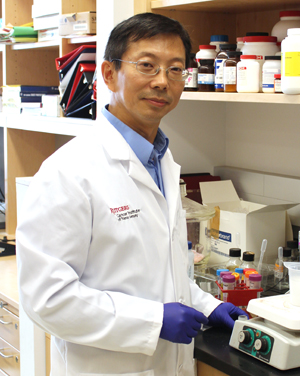 New research from Rutgers Cancer Institute of New Jersey shines a light on identifying ‘hot spots’ in drug-resistant mutations involving a certain protein found to influence cancer growth. Senior author X. F. Steven Zheng, PhD, chief of Division of Cancer Pharmacology, and co-leader of the Cancer Pharmacology and Preclinical Therapeutics Program at the Cancer Institute of New Jersey, shares more about the study, which is published in the current online edition of ‘Cell Reports’ (doi: http://dx.doi.org/10.1016/j.celrep.2015.03.040).
New research from Rutgers Cancer Institute of New Jersey shines a light on identifying ‘hot spots’ in drug-resistant mutations involving a certain protein found to influence cancer growth. Senior author X. F. Steven Zheng, PhD, chief of Division of Cancer Pharmacology, and co-leader of the Cancer Pharmacology and Preclinical Therapeutics Program at the Cancer Institute of New Jersey, shares more about the study, which is published in the current online edition of ‘Cell Reports’ (doi: http://dx.doi.org/10.1016/j.celrep.2015.03.040).
Q: The work involves the mTOR protein – a central controller of cell growth and metabolism and a key driver of cancer. It is also a target for anti-cancer drugs. Drugs have been designed to block mTOR’s ability to modify other proteins, and some of these agents have proven effective in human clinical trials; however, the tumors typically develop drug resistance within six months after initial treatment. What did your work aim to uncover?
A: Targeted cancer therapy is a newer treatment method using drugs to attack key cancer-causing molecules, which specifically arrest cancer cells with low side effects on normal tissues. Cancer DNA is very unstable and can be mutated very rapidly, often giving rise to a small population of cancer cells with drug-resistant mutations. These cancer cells are able to continue propagating during treatment, and eventually develop into relapsed tumors, typically within six months of initial treatment. mTOR is a key cancer-driving molecule that relays growth signals in tumor cells. A new class of mTOR-targeting agents, known as mTOR kinase inhibitors, is currently in human clinical trials for a broad range of cancer types. The aim of our study is to demonstrate if and where drug-refractory mutations may occur.
Q: What did your team do to identify drug-resistant mutations?
A: Discovery of cancer drug-resistant mutations is a long tedious process. To develop a simple, rapid screening method, we turned to baker’s yeast -- a small organism that divides very rapidly and is commonly used in the bakery. We engineered a humanized yeast strain so its growth is sensitive to mTOR blocking drugs. It provides a convenient way to survey millions of alterations or mutations in mTOR. In a short period of time, we were able to find a specific site or ‘hotspot’ on mTOR, when altered inappropriately, causes drug-resistance. Dr. Stephen Burley, director of Rutgers Center for Integrative Proteomics and a renowned structural biologist, helped us to show that this site is actually critical for drug binding. We proceeded to show that the mutant forms of mTOR are refractory to drug binding and inhibition in breast, colorectal and lung cancers.
Q: Why is the identification of these drug-resistant mutation profiles so important?
A: These mutations are very informative. Successful targeted therapies nowadays require so-called ‘companion biomarkers’ to help identify drug resistant mutations. Oncologists use such information to develop appropriate treatment plans. Knowledge of drug resistant mutations can also be applied to designing newer drugs that are not affected by drug-resistant mutations.
Along with Dr. Zheng, the author team consists of Tzung-Ju Wu and Xiaowen Wang, both Cancer Institute, Robert Wood Johnson Medical School and Graduate Program in Cellular and Molecular Pharmacology at Rutgers University; Yanjie Zhang, Linghua Meng and John E. Kerrigan, both Cancer Institute and Robert Wood Johnson Medical School; and Stephen K. Burley, Cancer Institute and Rutgers Center for Integrated Proteomic Research at Rutgers University. The study was supported by grants from the National Institutes of Health (R01 CA123391 and R01 CA166575 – Zheng). Rutgers Cancer Institute of New Jersey Flow Cytometry and Bioinformatics Core Facilities were supported by National Cancer Institute Cancer Center Support Grant P30-CA072720.

